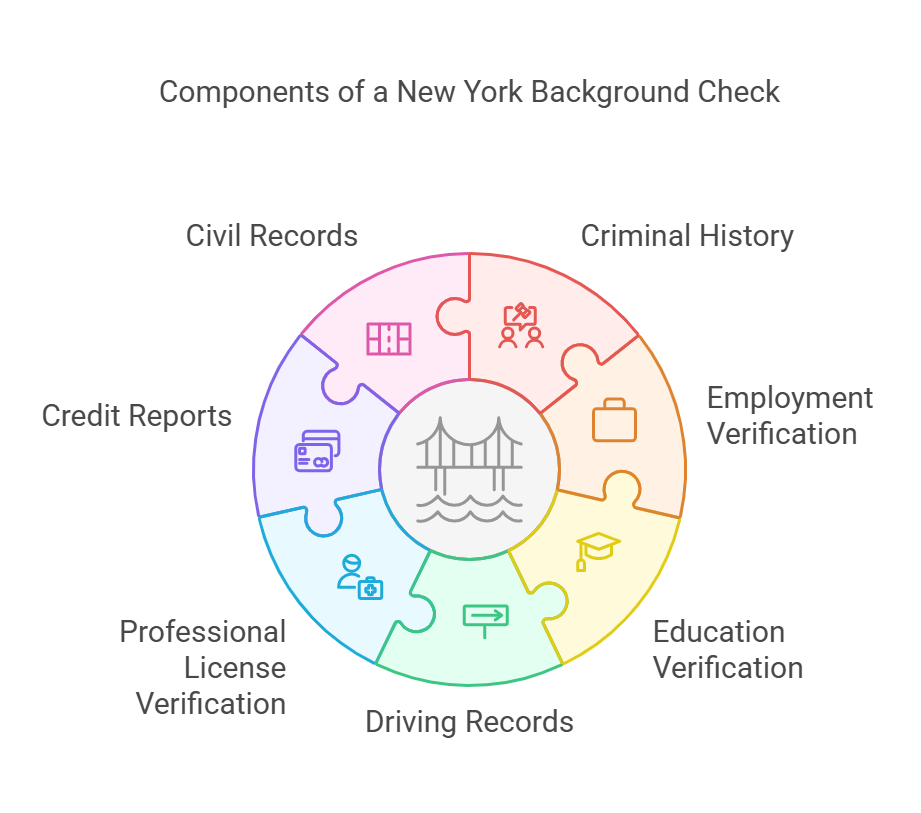In today's rapidly shifting job market, ensuring a safe and qualified workforce is crucial for employers. For HR professionals in New York, navigating the complexities of background checks can be particularly challenging, given the array of federal, state, and local regulations that come into play. This guide will illuminate the key aspects of New York background checks, simplifying the process for HR departments and providing peace of mind for job seekers.
Key Takeaways
- Understanding background checks in New York requires compliance with federal, state, and local laws to ensure fair hiring practices.
- Different industries in New York have specific background check requirements to align with their unique hiring needs.
- Common elements of background checks include criminal history, employment verification, education verification, and possibly credit reports.
- Job seekers in New York have rights such as consent and receiving explanations for adverse hiring decisions.
- Background checks are integral to the hiring process in New York, balancing employer needs and applicant rights.
Understanding New York Background Check Law
Navigating New York's background check laws requires attention to various federal, state, and local regulations. Here's a breakdown to simplify the process for employers and job applicants alike.
EXPERT INSIGHT: According to the U.S. Bureau of Labor Statistics, "Total nonfarm employment for the New York-Newark-Jersey City, NY-NJ-PA, metropolitan area increased by 139,200 over the year in November, the U.S. Regional Commissioner William J. Sibley noted that the local rate of job gain, 1.4 percent, was the same as the 1.4-percent national increase." With such a vast pool of employees and potential candidates, it is imperative for both prospective employees and employers—especially HR Practitioners and Headhunters—to be well-versed in pre-employment requirements and background check proceedings. Understanding these processes ensures a fair and transparent hiring environment, fostering trust and compliance with legal standards. This article delves into the critical steps and considerations for handling adverse action notices in New York, providing valuable insights for navigating the complexities of the state's employment landscape. - Emile Garcia, SHRM-SCP, CHRP, CHRBP
Federal Laws
The Fair Credit Reporting Act (FCRA) dictates how background checks are used across the country. Employers must notify candidates in writing and get written consent before running these checks. If the information leads to adverse action, the candidate must receive a copy of the report and a summary of their rights.
The Equal Employment Opportunity Commission (EEOC) provides guidelines to prevent discrimination during the hiring process. It stresses that checks should not disproportionately exclude any demographic group unless necessary for a business's operations.
New York State Laws
New York State has its own Human Rights Law, which protects against discrimination based on age, race, gender, and other categories. This law affects hiring practices, enforcing that the decision to not hire cannot be based unfairly on characteristics protected by law.
The Stop Credit Discrimination in Employment Act limits the use of credit checks in employment decisions. Such checks are only permissible if required by law or relevant to the job duties, such as financial roles.
Local Laws
In New York City, employers must comply with the Fair Chance Act. This law postpones any criminal background inquiries until after a conditional job offer is made. This supports those with criminal records in getting fair consideration for employment opportunities.
Other Considerations
The "Ban the Box" initiative prevents employers from including questions about criminal history on job applications. This aims to give applicants with a criminal history a better chance by delaying when employers can inquire about criminal records.
Employers must also be aware of industry-specific guidelines. For instance, health care positions might have more stringent checks due to the nature of the job responsibilities. Understanding these fluctuations can keep your hiring process both compliant and efficient.
What Shows Up on a New York Background Check?
In New York, background checks typically cover several key areas to provide a comprehensive view of an applicant's history. First off, criminal history information is a crucial component. It includes records of convictions but not arrests that didn't lead to conviction. New York law places limits on using older criminal records, particularly those dating back seven or more years, and mandates a fair chance to explain circumstances surrounding any convictions.
Moving to the workplace, employment verification confirms past job details like positions held and dates of employment. It's a straightforward check but essential for validating resumes. Alongside this, education verification checks whether candidates have the academic credentials they claim, crucial for roles where certain qualifications are mandatory.
For roles involving driving, driving records might be assessed, focusing on traffic violations, license status, and any suspensions. Professional license verification ensures that any licenses pertinent to a profession—say, nursing or law—are valid and up to date.
Credit reports can be part of the equation but are typically checked under very narrow circumstances, mainly when financial responsibility is directly relevant to the job. New York's Stop Credit Discrimination in Employment Act restricts when a credit check is allowable, so employers need to tread carefully here.
Lastly, civil records cover non-criminal matters like lawsuits and judgments, which might be considered for roles that demand a high level of trust or involve financial decision-making. For employers and applicants, understanding these elements can help ensure clarity and fairness in the hiring process.

New York Employment Screening Best Practices by Industry
In New York, employment screening is anything but a one-size-fits-all process. Industries vary widely in what they need to look for in a candidate's background. For example, healthcare employers often prioritize thorough checks on professional licenses and any past sanctions or malpractice suits, given the sensitive nature of patient care. In contrast, the finance sector places a higher emphasis on credit history and criminal records to safeguard against fraud and ensure regulatory compliance.
Transportation roles hinge significantly on an applicant’s driving records. Employers in this industry must assess any history of traffic violations or DUIs to ensure safety on the road. Meanwhile, tech companies tend to focus more on employment and education verifications to confirm technical skills and credentials.
By adapting screening practices to align with specific industry requirements, employers not only enhance the relevance of their checks but also bolster overall workplace safety and integrity. Understanding these nuances helps ensure the right balance between thoroughness in background checks and respect for applicant privacy.
New York Government Resources
Navigating the various resources available for understanding New York background checks can streamline the hiring process and ensure compliance with all necessary regulations. Here's a quick look at some key resources that can help employers and job seekers alike.
- New York State Division of Criminal Justice Services (DCJS): Provides information on criminal history records, fingerprinting, and licensing requirements in NY.
- New York Department of State, Division of Licensing Services: Covers licensing and regulatory requirements for industries that mandate background checks, like security guards and real estate professionals.
- New York Courts (Unified Court System): Offers information on public access to court records and background check policies for judiciary-related processes.
- New York State Office of the Attorney General: Provides resources about consumer rights, including employer compliance with background check laws.
- Department of Labor: Provides comprehensive guidelines on hiring practices and employment laws. It's a crucial resource for staying updated on federal employment regulations that impact background checks.
- Equal Employment Opportunity Commission (EEOC): Offers information on how to conduct background checks without violating federal discrimination laws. Their guidance ensures that employment screenings are conducted fairly and within legal boundaries.
- Professional Background Screening Association (PBSA): Sets the industry standards for background checks. This organization provides support and resources for conducting screenings effectively, making sure they meet both legal and ethical standards.
These resources are indispensable for understanding the intricacies of background checks and ensuring that both employers and applicants navigate the process smoothly, adhering to necessary legal requirements.
Glossary of Terms
- Fair Credit Reporting Act (FCRA): The FCRA is a federal law that governs how employers can obtain and use consumer reports, including background checks, during the hiring process. It requires employers to notify job applicants in writing and obtain their written consent before conducting a background check. Should an adverse employment decision be made based on the report’s findings, the law mandates providing the applicant with a copy of the report and a summary of their rights to dispute inaccuracies.
- Ban the Box: "Ban the Box" is a policy designed to promote fair employment opportunities for individuals with criminal records. It prohibits employers from including questions about an applicant's criminal history on job applications. This initiative aims to delay inquiries about criminal records until later stages of the hiring process, such as after a conditional job offer, giving applicants a chance to be evaluated based on their qualifications first.
- New York City Fair Chance Act: The Fair Chance Act is a law in New York City that significantly restricts when and how employers can inquire about a candidate’s criminal history. Under this law, employers may only conduct criminal background checks after extending a conditional offer of employment. If the offer is revoked due to the results, employers are required to provide written documentation explaining the decision, share the background check results, and allow applicants time to respond or dispute the findings. This legislation promotes fair access to employment for individuals with past convictions.
Frequently Asked Questions
What are the key background check laws in New York for employers?
Employers in New York must navigate a mix of federal, state, and local regulations when conducting background checks. Key laws include the Fair Credit Reporting Act (FCRA), New York State Human Rights Law, the Stop Credit Discrimination in Employment Act, and the New York City Fair Chance Act. These laws govern how and when background checks can be conducted, with an emphasis on privacy and non-discrimination.
How does the Fair Credit Reporting Act (FCRA) apply to background checks in New York?
The FCRA regulates how employers can obtain and use credit reports and other background information from third-party agencies. In New York, this means employers need written consent from the applicant before obtaining a report. They must also follow specific protocols if they decide to take adverse action based on the report. This includes including informing the applicant and providing them a copy of the report.
Can employers in New York conduct criminal background checks on job applicants?
Yes, employers can perform criminal background checks on job applicants. However, specific laws, like the New York City Fair Chance Act, require that employers wait until after a conditional job offer has been made before inquiring about a candidate's criminal history. This helps minimize discrimination based on arrest or conviction records that do not have a direct relation to the job.
Are there specific restrictions on using arrest records for employment decisions in New York?
In New York, employers cannot use arrest records that did not result in a conviction when making employment decisions. The New York State Human Rights Law protects individuals from discrimination based on their arrest records. In turn, reinforcing the need for fair employment practices.
How should employers handle adverse action notices in New York?
If an employer in New York decides not to hire an applicant based on information found in a background check, they must provide an adverse action notice. This notice should inform the applicant of the decision, provide a copy of the background check report, and explain their rights under the FCRA, including the right to dispute the information. Employers should also give the applicant a reasonable amount of time to respond before making a final decision. It is important to maintain clear communication and document all steps taken.
Additionally, employers must comply with any state-specific regulations that may apply. New York's Fair Chance Act, for example, has provisions to protect individuals with criminal records. Ensuring transparency throughout the process helps maintain trust and fairness. Employers should also provide resources or guidance on how to dispute inaccurate information. Being thorough and considerate in handling adverse action notices can prevent potential legal issues and promote a fair hiring process.
What rights do job applicants have regarding background checks in New York?
Job applicants in New York have rights that ensure transparency and fairness in the background check process. These include the right to know if a background check is being conducted, to consent to the process, and to be informed if a negative decision is made based on the report. They also have the right to dispute any inaccuracies in the report.
How long does it take to complete a background check in New York?
The time it takes to complete a background check in New York can vary, typically ranging from a few days to a couple of weeks. Factors such as the extent of the check, the specific information being verified, and the responsiveness of previous employers or educational institutions can affect the timeline.
What types of background checks are common for New York employers?
Common background checks for New York employers include criminal background checks, employment and education verification, professional license verification, and in some cases, credit checks. The specific types of checks conducted often depend on the industry and the requirements of the job.
How do New York's background check laws compare to other states?
New York's background check laws are more stringent in certain aspects, particularly in cities like New York City with additional regulations like the Fair Chance Act. These laws emphasize privacy and non-discrimination, reflecting a trend of increased regulation compared to some other states.
What should HR professionals know about compliance when conducting background checks in New York?
HR professionals should stay informed about both state and local laws that govern the background check process. This includes obtaining proper consent, ensuring non-discriminatory practices, and handling any adverse actions in compliance with the FCRA and state guidelines. Regularly updated training and reliance on reputable screening services can help maintain compliance.
Conclusion
In the bustling environment of recruitment, mastering the intricacies of New York's background check regulations is crucial for both employers and job seekers. This guide has navigated you through the patchwork of federal, state, and local laws, offering insights into how these rules shape hiring practices. By following best practices tailored to various industries, employers can execute comprehensive background screenings while adhering to legal standards. This approach not only safeguards the workforce but also empowers applicants with the clarity they need to engage in the hiring process. As you move forward, let these principles guide you toward fair and effective employment practices in New York.
Additional Resources
Still have questions?
Get in touch with our team today for a personalized demo and discover how our tailored volume pricing and packages can drive results for your business!
How useful was this page?*
Note: your comments are anonymous. We use them to improve the website. Do not include any personal details.
Visit our FCRA Compliance Tool or leave a message here if you need a response.
From the blog Explore the GCheck Content Hub

EEOC Compliance Requirements 2026: Complete Employer Guide to Fair Hiring Practices
29 Dec, 2025 • 24 min read
FCRA Compliance Guidelines 2026: Essential Requirements for Employers
29 Dec, 2025 • 26 min read
Ban the Box Laws 2026: Complete State Compliance Guide for Fair Chance Hiring
29 Dec, 2025 • 18 min readThe information provided in this article is for general informational and educational purposes only and should not be construed as legal advice or a substitute for consultation with qualified legal counsel. While we strive to ensure accuracy, employment screening laws and regulations—including but not limited to the Fair Credit Reporting Act (FCRA), Equal Employment Opportunity Commission (EEOC) guidelines, state and local ban-the-box laws, industry-specific requirements, and other applicable federal, state, and local statutes—are subject to frequent changes, varying interpretations, and jurisdiction-specific applications that may affect their implementation in your organization. Employers and screening decision-makers are solely responsible for ensuring their background check policies, procedures, and practices comply with all applicable laws and regulations relevant to their specific industry, location, and circumstances. We strongly recommend consulting with qualified employment law attorneys and compliance professionals before making hiring, tenant screening, or other decisions based on background check information.


